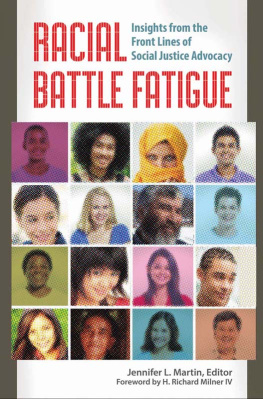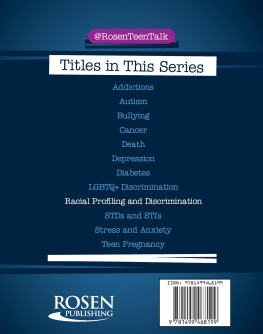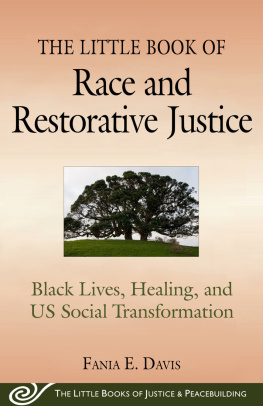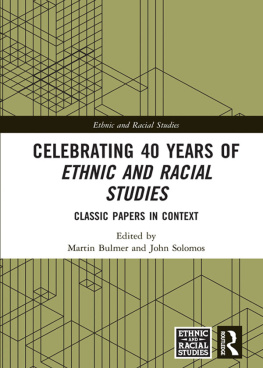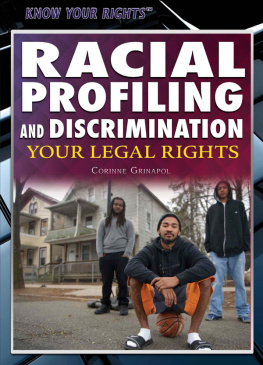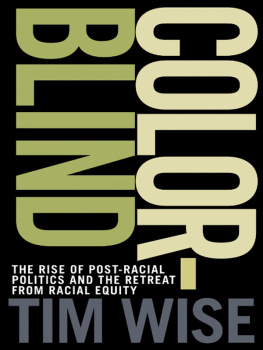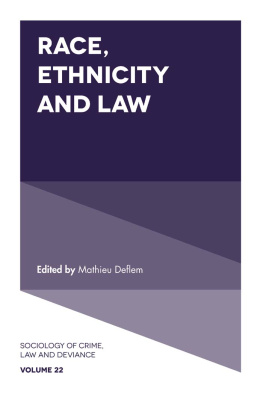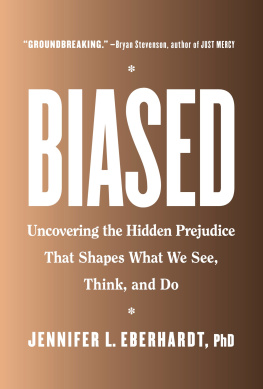Racial Battle Fatigue
Racial Battle Fatigue
Insights from the Front Lines of Social Justice Advocacy
Jennifer L. Martin, Editor
Foreword by H. Richard Milner IV

Copyright 2015 by Jennifer L. Martin
All rights reserved. No part of this publication may be reproduced, stored in a retrieval system, or transmitted, in any form or by any means, electronic, mechanical, photocopying, recording, or otherwise, except for the inclusion of brief quotations in a review, without prior permission in writing from the publisher.
Library of Congress Cataloging-in-Publication Data
Racial battle fatigue : insights from the front lines of social justice advocacy / Jennifer L. Martin, editor ; foreword by H. Richard Milner IV.
pages cm
Includes bibliographical references and index.
ISBN 978-1-4408-3209-3 (print : alk. paper) ISBN 978-1-4408-3210-9 (e-book)
1. Discrimination in educationUnited States. 2. RacismUnited States. 3. RacismUnited StatesStudy and teaching. 4. Social justiceUnited States. 5. Social justiceUnited StatesStudy and teaching. I. Martin, Jennifer L. (Professor of education)
LC212.2.R325 2015
371.82996073dc23 2014029036
ISBN: 978-1-4408-3209-3
EISBN: 978-1-4408-3210-9
19 18 17 16 15 1 2 3 4 5
This book is also available on the World Wide Web as an eBook.
Visit www.abc-clio.com for details.
Praeger
An Imprint of ABC-CLIO, LLC
ABC-CLIO, LLC
130 Cremona Drive, P.O. Box 1911
Santa Barbara, California 93116-1911
This book is printed on acid-free paper 
Manufactured in the United States of America
Contents
H. Richard Milner IV
In 1964, Fannie Lou Hamer delivered a provocative speech at the Williams Institutional CME Church in Harlem, New York. The title of her lecture was Im Sick and Tired of Being Sick and Tired. Hamer, a Black woman born in 1916 in Montgomery County, Mississippi, was a civil rights leader and worked tirelessly for voting rights for Black people and other marginalized groups. In her speech, she talked about racist and sexist experiences she encountered in Mississippi and also stressed that some in other cities across the United States still dealt with relentless discrimination against Black people and women in particular. A central point of her lecture was that some people were not free at all and that current conditions caused some to experience life in society in slave-like ways, even though federal mandates had begun to support rights among all citizenry in the United States. She provided poignant stories of resilience of her family as they worked and fought through phobias and isms both in their personal interactions in the south and in the workforce. The title of Hamers speech metaphorically connects with the theme and message of this book. Like Hamer, the authors of this volume are sick and tired of being sick and tired of racist, sexist, homophobic, xenophobic, hegemonic, and inequitable structures and systems both inside and outside of education.
Racial Battle Fatigue: Insights from the Front Lines of Social Justice Advocacy is a powerfully important volume that brings together a diverse range of scholars committed to social justice. The stories shared in this book provide empirical, analytical, and conceptual sites of nuance that allow consumers of the text to critically examine how oppressive conditions can foster psychological, socio-emotional and cognitive strain as social justice advocates work to expose and dismantle inequity. Although much of the empirical and theoretical scholarship related to microaggression has shepherded the field into more deeply examining, measuring, and understanding race and racism, this book extends this dialoguenot ignoring the salience and permanence of racismby including other forms of marginalization such as gender discrimination and the intersecting nature of oppressive structures such as racism and gender discrimination.
Although some still believe and advance conversations that would suggest that we currently live in a postracial U.S. societymainly because of the election of our nations first Black presidentthis book disputes this notion by providing compelling examples of the ways in which microaggressions still manifest in peoples everyday lives. Unlike some edited volumes, here are consistent and provocative stories between and among the different chapters that draw a logical story line, which allows the book to tackle common themes from diverse perspectives. Thus, readers of this text will learn about how the micro can result in macro outcomes. As institutions of higher education (and beyond) slowly and incrementally undermine the very essence and existence of particular individuals and groups of people, they almost methodically ensure that these people continue to be negatively influenced personally. Moreover, the slow (and what might be seen as small) actions that undermine some by those in power work to ensure that the perspectives, contributions, and actions of those committed to social justice and equity remain on the margins. In this way, readers are invited to think about and deepen their insights about how racial battle fatigue can exist and why. This book makes the case for why it is critical that social justice workers are not bullied away from emancipatory work that can make a difference for those within and outside of traditional institutions of education.
Across the chapters, the stories shared about the challenges these social justice educators face indeed provide insights into what the editor Jennifer Martin calls a pedagogy of vulnerability . And while her explanation of this pedagogy is shaped by her untenured status, such vulnerability likely will not end post-tenure. For instance, as a scholar committed to social justice but also one who experiences microaggressions, even as an endowed chair and full professor at a research-intensive-institution, the sad reality is that even after one earns tenure, microaggressions persist and racial battle fatigue can intensify. They may falter a bitbecome somewhat less noticeable or occur less frequentlybut microaggressions and the fatigue they cause continue.
Just a few weeks ago, as an African American male, I sat in a meeting and offered my perspective to the group about ways to increase the number of doctoral applications to our program. People in the room ignored my suggestionsmoving on by offering others. Then, a few minutes later, a white colleague at my same rank offered the exact same suggestion I made minutes prior. This time, the suggestion was accepted, and this full professor was lauded for such an outstanding idea. But the idea was mine, and I offered it just minutes earlier. However, the white colleagues in the room either did not hear me or did not want to hear me. But I, like Fannie Lou Hamer and the authors of this book, am sick and tired of being sick and tired . Revealing these microaggressions is only part of a much more complex task we face. We must do something about them. This book is not only a compelling example of how an edited volume can bring together a set of collective voices to expose readers to the persistence of racism and other forms of discrimination, it is also a call to action to actually do something to end these toxic (individual and institutional) practices! Exposing microaggressions; calling them out when they occur; and demanding individual, structural, and systemic shifts are but a few ways we can redress their deleterious effects. But as the authors of this book query, is it possible for microaggressionsespecially related to raceto ever completely end in a society in which race and racism are at the very core of our work and lives? Certainly our physical, mental, physiological, psychological, and emotional humanity are at stake and deserve better! Fortunately, this book takes us one step forward in the arduous task for social justice.
Next page
